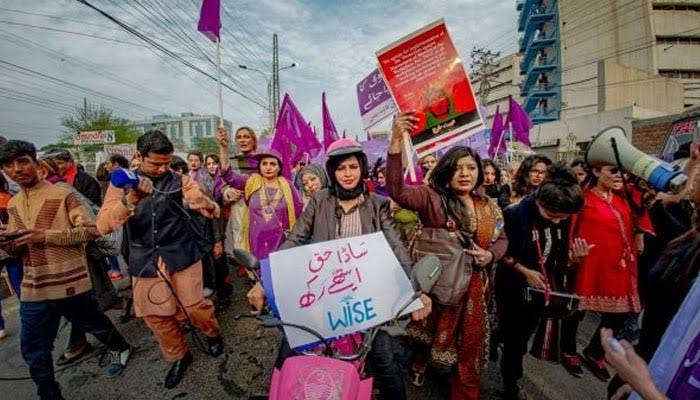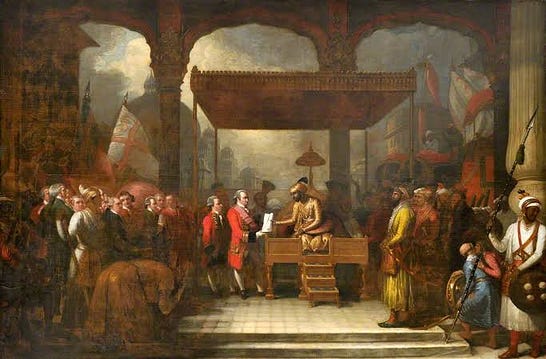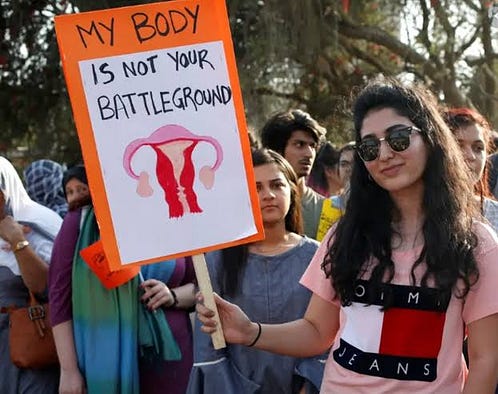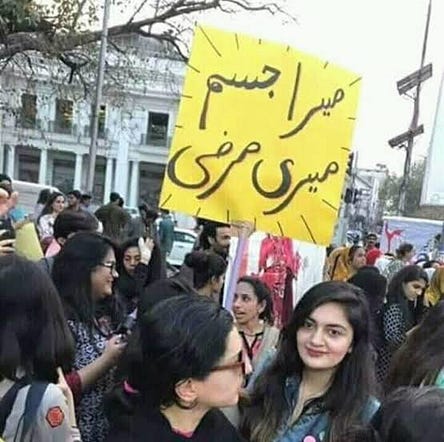A mockery of the feminist movement in Pakistan: how local women fail to see the bigger picture

Since the current socio-political scenario in Pakistan is hot with the demand to complete the wave of Feminist protests which were left (almost) incomplete due to backlash from conservatives in March this year, I want to underline a few implications of the trending Aurat March (Women’s March) now taking over social media. In solidarity with the tragedy that occurred on the Lahore Motorway; the gang rape of a woman before her children, many women and some men took to the streets once again holding placards, but this time the texts were slightly different.
Were all those protesters united on the ideological front? Apparently. But the return of #MeraJismMeriMarzi (my body, my rules) had me questioning whether it was the reprise of that trend to inculcate Western values into local society.
Now what would constitute Western? Every society has cultural variations, and the Western world is a paradigm which was introduced into dialogue when the first English privateer, Captain William Hawkins, set foot on Indian soil, since the pivotal turning point in decolonization history was the liquidation of English rule in India (the rest of Europe then followed). Privatization has had different implications since, from Shah Alam II’s handing over the reins of his very Indian company, the Diwani to Robert Clive and setting the precedent for English takeover of all local businesses, five hundred or so years into the formulation of the definition of privatization, the meaning has evolved. We are on the receiving end of the 'West and the Rest' spectrum since the West is basically the giver. It provided us with formulas for economy, administration, education, yet, despite our role as the cups to their pitcher of information, the so called 'Rest' had maintained it’s own cultural values.

Every society needs to evolve. Societies that remain static in the face of a dynamic world ultimately dissipate. This axiom could be considered Hegel 101. But certain sections of Pakistani society failed to keep up with the times. Certain sections refused to accept that since the first world war the family unit had changed dramatically from large groupings of multiple generations to a nuclear one constituting simply a husband, wife, and their children. This change did not come only in Europe and the Americas, it was introduced into South East Asia with equal force. SEA received foreign intervention into the cultural family unit, but it refused to accept the accommodation that needed to go with it; the introduction of equal opportunities for women.
Women had now become breadwinners alongside husbands because labor was divided between single member of both genders rather than multiple members of the same gender (as was the norm for men in group families). Yet some women were excused from going to work when they were in the family way. This became a trend in Pakistan too and in the twenty first century, most families are nuclear where women need to work (most of the times). As this imbalance of information intake and failure of sustaining accommodation increased, the youth started absorbing most of the Western values that started first with the family, then education, and eventually into society as a whole. What the sociogenesis experts would say that the individual affects the society which in turn affects the individual. It is a reciprocal relationship where, in Pakistan, neither did the other justice.
The concept of globalization has weaponized media and eventually its extension, the social media, where coming across people of polarized cultural values is as easy as going to the kitchen. The western world is appealing. There is freedom of expression; freedom from parental constraints; psychological freedom from religious dilemmas of right and wrong (since no one there would bother with your ideological inclination)...and this appealing scenario, for those of us who could not have the means and the opportunity to flee the country, introduced in us the desire to import in its entirety the picture that is the West. As during the time of Napoleon the entire geographical space that was NOT Europe became a mono-culture of Arabian Nights, African markets, elephant safaris, turban-wearing extravagant-looking fat men anywhere and everywhere in the 'Orient', for us in the 'Rest', all of Europe became the epitome of freedom.
The Occident woman was earning, she was travelling alone, she was becoming an active member of society, and her vote had equal merit as that of the man. Yet at home the former restrictions on her continued. But restrictions would be different for different people.
For me, a woman in Pakistan, a restriction would be my parents' injustice had they refused me the same education as my brothers. Or if I were not allowed to enjoy the same food as them, or watch the same shows. In certain local families this is still the case. Sons are an asset while daughters are a burden. And this causes certain parents to get their daughters wedded off into families where they do not wish to go and therein suffer emotional, physical abuse. Their voice is suppressed and they are eventually cut off from everything but their husbands and children- and this latter scenario Betty Freidan sketched in her brilliant book 'The Feminine Mystique’, women were depressed, they were suicidal, and doctors had no cure for they could not isolate an ailment. But she was describing the dilemma of the average American woman in the early twentieth century. Women who were educated, privileged, happily married. So it would have me conclude that if the average woman in the west is suffering just the same as the average woman in the east, it is not the geographical placement that is the problem.


The twenty first century Pakistani woman is roaming the streets with placards, shouting 'Mera Jism, Meri Marzi' (my body, my rules), and the international media would have people think that in Pakistan, women are not given their due right. In certain places that indeed is true. Like I said above, some rural families completely destroy a woman’s moral worth. But how many of those oppressed women are seen as activists during these marches. Last time I could spot at most two? So who are these women who constitute the major bulk of the Aurat March protests and what is their narrative? A great majority of these women are those like myself; privileged, educated, and the apple of their parents’ eyes. Many of whom I know on a personal level. Many of whom went to the same school as I, and whose thought processes I have come to understand via intimate dialogue. Many of them have never known oppression in their entire life.
This is that particular section which is merely imbibing information distributed by the elites who have access to a wide platform on social media. Those dispensers of attractive narrative who bring in with them a certain sense of western elitism. Women who have worked for foreign NGOs and are now operating their own in Pakistan. Some women who have actively worked against the local nation building narrative and have refused to write down a document elaborating their demands in full so that the narrative is solidified. No! They have refused to do their cause justice because they’re aware that it will win no favors amidst the greater local majority and because were they to write down such a document, they would need to add addenda upon addenda for they are constantly importing foreign ideals. Previous placards demanded an almost 'state of nature' level freedom exclusively for women, where laws need not be written down and women be allowed to do as they please. They may sit as they like, they may talk and walk as they like, and they may dress as they like, with the onus of responsibility on the man. If a woman dresses in revealing clothing, the man should control his gaze (as he should but where does his duty end and ours begin?). If a woman is deliberating not to shave her mustache, cut her hair short, or not to shower, she should not be discriminated against by a man. If she wants to smoke, drink alcohol, or roam around late at night, she should not be questioned or prompted by her father. A particular card even encouraged a Bacchic misandry with a man’s severed head in the microwave oven.

Granted, few placards demanded basic rights such as equal jobs and pay, education, right to choose one’s spouse, plenty were downright crude. Since even Pakistani men who drink and smoke, roam around in inappropriate dressing (no shirtless man would be entertained in decent society), and do not maintain proper hygiene are equally looked down upon, then why should the women be treated any differently? Why should they be allowed to do all the above just because men have been doing so for a long time? Where is the feminine sensibility? Or do women not even care for such a thing anymore?
With enough digression, I will now return to the implications of this reprise of the Aurat March. Frankly, the local feminist community is quite divided. One faction is indeed actively demonstrating to get justice for the aggrieved lady and demanding the criminals' deaths be made a spectacle. One faction however is using the opportunity to inculcate the 'western feminist' values of unhinged freedom to women. One faction is an anti national lobbyist whose primary goal is to create a negative Pakistani narrative.
Now what will the success of the last two groups of women/men do?
a) This would first breakdown the primary family unit. Parental respect will eventually dissolve when parents lose the right to object against their children’s questionable behavior.
b) Cultural values will become inextricably intertwined with religious values with eventual desecration of both. The Islamic order of shame and covering up to both genders in every aspect of individual and social life will diminish. Men and women will take liberties with each other and this will inevitably result in more rape cases with proliferation of such protests.
c) A negative outlook of the local youth towards Pakistan in general will heighten the desire to bring in more of the West into the East and thoroughly smash the institution of marriage. Sexual liaisons will become the norm and men and women will no longer feel the need to marry. Naturally this will take a few years but this will be the inevitable result. Given that certain female demonstrators presented divorce as the best feeling in the world, impressionable minds will not hesitate to follow.
d) Vulgar speech with highly sexual innuendos will demoralize society into a puppet wing of the west. The citizens would be mere tools to perpetuate further immoralities in the country, devoid of identity.
e) The national identity as a whole will perish.
Although this may sound as one bleak presentation of the consequences of the local feminist movement, it is a gradual process that is inevitable if it were not stopped in the tracks or steered in the right direction. The targets of certain agendas are indeed impressionable, youthful minds, blank slates that can be etched on with just about any ideology if they’re given the impetus and the push by the right people. The purpose of this article is in no way to undermine the movement that actually seeks to use the media to press the government to take action against the perpetrators of the motorway incident, it is but to alert sincere minds not to be deviated by certain elements whose narrative is not to build the nation for the better, but to destroy it.





Comments
Post a Comment